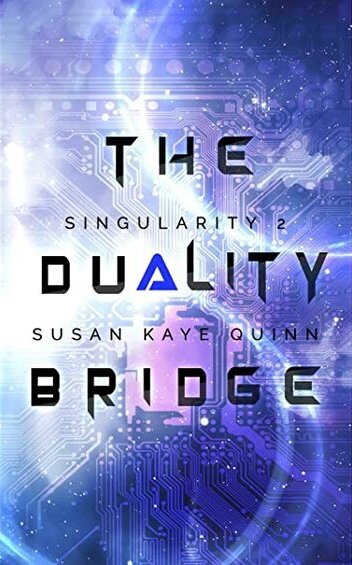
In the debut of Susan Kaye Quinn’s series of four novels about life after the Singularity, Elijah Brighton and two teenage Frenchwomen won gold medals in the Olympics. The awards made them eligible to transition from legacy humans to ascenders, the god-like immortals who now reign over the Earth. But powerful forces snatched away their medals when they defiantly showed their support for the human Resistance. Now, in The Duality Bridge, the three brilliant young leaders—medalists in painting, storytelling, and dance—are actively working with the rebels. Together with other courageous legacy humans, rebel ascenders, and robots, they broadcast their message of defiance on Orion, the ascenders’ global network, seeking to undermine the stifling regime imposed on the planet by the immortals.
A muddled religious message
At the heart of this novel, and of the series as a whole, is the author’s muddled religious message. Somewhere outside of time and space there exists another plane of existence. Meditation practices and the Dalai Lama himself feature in the story, implying that devout Buddhists may attain access to it. But Elijah is uniquely able to reach that dimension of being through what he calls a fugue state. As we learned in The Legacy Human, the novel that first explored life after the Singularity, Elijah is only half-human. He’s the product of an experiment carried out on his mother by a group of ascenders who sought to learn whether ascenders have souls. He is, in short, the “bridge” to that otherwise unattainable plane of existence.
Clear? Clear as mud, actually.
The Duality Bridge (Singularity #2 of 4) by Susan Kaye Quinn (2015) 426 pages ★★★☆☆

Plot twists and improbable escapes in abundance
To get this message across, Quinn follows Elijah and the band of rebels around him through an improbably long and complicated series of close scrapes with the evil ascenders who are out to destroy them. I don’t think I’ve ever seen so many last-minute shifts of direction in the plot in a single book.
In The Legacy Human, the evil presence was a powerful ascender named Marcus. Now, in the sequel, an even more powerful and malignant ascender named Augustus emerges as the bad guy. And Marcus switches sides to the rebels! As I said, improbable.
When I began the Singularity series, I’d hoped to read all four books. As you might guess, I won’t be wasting any more time on the third one. I’ll look elsewhere for a more credible and better-written story about life after the Singularity.
For more reading
I’ve reviewed the first book in the Singularity series, The Legacy Human (After the singularity, immortality for billions).
For more good reading, check out:
- The ultimate guide to the all-time best science fiction novels
- Great sci-fi novels reviewed: my top 10 (plus 100 runners-up)
- The five best First Cotact novels
- Seven new science fiction authors worth reading
- The top 10 dystopian novels reviewed here
And you can always find my most popular reviews, and the most recent ones, plus a guide to this whole site, on the Home Page.


























